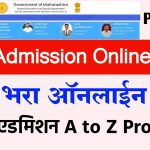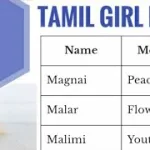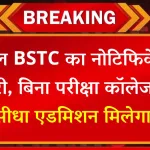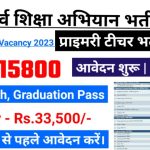BSTC (Basic School Teaching Certificate) Syllabus, covering all aspects, including the subjects, exam pattern, and preparation strategy. The BSTC exam is primarily for admission into the D.El.Ed (Diploma in Elementary Education) course in Rajasthan.
Overview of BSTC Exam
The BSTC Exam is a state-level entrance test conducted in Rajasthan for candidates aspiring to pursue the D.El.Ed. program. The exam is typically held once a year and covers four main subjects: Mental Ability, General Knowledge of Rajasthan, Teaching Aptitude, and Language Ability (which includes English, Hindi, and Sanskrit).
The exam aims to test the knowledge, teaching aptitude, and general awareness of candidates. Successful candidates can enroll in the two-year D.El.Ed. program, preparing them to teach at the elementary level.
BSTC Syllabus 2024
The syllabus for the BSTC exam is divided into four major sections:
Section 1: Mental Ability
This section assesses a candidate’s reasoning and analytical abilities. The major topics include:
Reasoning: Analogy, Series, Coding-Decoding, Logical Diagrams.
Discrimination: Visual and verbal, identifying differences.
Relationship Analysis: Family relations, directions, blood relations.
Logical Thinking: Arrangements, sequences, and patterns.
Section 2: General Knowledge of Rajasthan
This section tests the candidate’s awareness of the state’s history, geography, culture, and current events. The topics include:
Historical Events of Rajasthan: Major historical events, freedom movements.
Geography of Rajasthan: Physical, political, and climatic aspects of Rajasthan.
Culture and Traditions: Folk dances, music, fairs, festivals, and languages.
Current Affairs of Rajasthan: Political and social events, sports, and awards.
Teaching Aptitude
This section evaluates a candidate’s teaching skills and understanding of pedagogy. The topics include:
Creativity in Teaching: Innovative methods and approaches to teaching.
Leadership Quality: Decision-making, problem-solving, classroom management.
Communication Skills: Verbal and non-verbal communication, effective teaching.
Professional Attitude: Ethics, empathy, and dedication in teaching.
Section 4: Language Ability
This section is divided into three sub-sections: Hindi, English, and Sanskrit (candidates need to choose two languages).
Hindi Language Ability:
Vocabulary, Grammar, Synonyms, Antonyms, Comprehension.
English Language Ability:
Vocabulary, Grammar, Tenses, Prepositions, Articles, Synonyms, Antonyms, Sentence Completion, Comprehension.
Sanskrit Language Ability:
Vocabulary, Grammar, Comprehension, Translation, Synonyms, Antonyms.
BSTC Exam Pattern
The BSTC exam pattern provides insights into how the paper is structured:
Total Number of Questions: 200
Type of Questions: Multiple Choice Questions (MCQs)
Total Marks: 600
Marks per Question: 3 marks
Negative Marking: No negative marking
Duration: 3 hours
Here is a breakdown of the exam pattern:
| Sections | No. of Questions | Marks per Question | Total Marks |
|---|---|---|---|
| Mental Ability | 50 | 3 | 150 |
| General Knowledge | 50 | 3 | 150 |
| Teaching Aptitude | 50 | 3 | 150 |
| Language Ability | 50 | 3 | 150 |
Candidates have to select two languages in the Language Ability section.
Topic-wise Detailed Syllabus
Mental Ability
Reasoning: Understand concepts like analogies, series, classifications, and coding-decoding. For analogies, focus on similarities between objects or ideas; for series, recognize sequences and patterns.
Discrimination: Visual discrimination (identifying differences in shapes, colors, etc.) and verbal discrimination (differences in word meanings).
Relationship Analysis: Family relationships, directions, blood relations, and puzzles related to relational understanding.
Logical Thinking: Sequential arrangements, syllogisms, and pattern-based problems.
General Knowledge of Rajasthan
History: Events like the Rajputana battles, Mughal era conflicts, the role of Rajasthan in the Indian freedom struggle, and major historical personalities of Rajasthan.
Geography: Physical structure (Thar Desert, Aravalli Range), rivers (Chambal, Luni), climate, natural resources, and agricultural patterns.
Culture: Traditional attires, folk dances (Ghoomar, Kalbeliya), music, local deities, famous temples, fairs (Pushkar Mela, Mewar Festival), and regional languages.
Current Affairs: Recent government schemes, political developments, awards, sports events, and significant state-level activities.
Teaching Aptitude
Creativity in Teaching: Explore new ways to make learning interesting using innovative methods, project-based learning, and interactive sessions.
Leadership Qualities: Decision-making abilities, problem-solving skills, and creating an engaging learning environment.
Communication Skills: Clear verbal communication, using gestures, maintaining eye contact, and understanding students’ non-verbal cues.
Professional Attitude: Maintaining discipline, empathy towards students, ethical behavior, and a proactive approach in the classroom.
Language Ability
Hindi: Basic grammar rules, vocabulary building, synonyms, antonyms, and sentence construction.
English: Focus on grammar (nouns, pronouns, verbs, tenses, conjunctions), vocabulary (synonyms, antonyms), reading comprehension, and sentence arrangement.
Sanskrit: Grammar, vocabulary, translation, and sentence construction.
Preparation Strategy for BSTC Exam
Subject-wise Tips
Mental Ability:
Practice regularly with reasoning puzzles, series problems, and analytical reasoning questions.
Use mock tests to enhance speed and accuracy.
General Knowledge of Rajasthan:
Read newspapers, especially the Rajasthan editions, to stay updated on current affairs.
Refer to Rajasthan-specific GK books and guides for historical, geographical, and cultural knowledge.
Teaching Aptitude:
Focus on understanding pedagogical theories and classroom management techniques.
Practice situational questions related to teaching aptitude.
Language Ability:
For Hindi and English, focus on grammar rules, comprehension, and vocabulary enhancement.
Regular practice of translations and sentence construction for Sanskrit.
Time Management
Allocate dedicated time slots for each subject.
Prioritize difficult topics and allocate more time for revision.
Recommended Books
Mental Ability: ‘A Modern Approach to Verbal & Non-Verbal Reasoning’ by R.S. Aggarwal.
Rajasthan GK: ‘Rajasthan General Knowledge’ by Lucent Publications.
Teaching Aptitude: ‘Teaching Aptitude & Pedagogy’ by KVS Madan.
Language Ability: ‘Objective General English’ by S.P. Bakshi for English and standard Hindi grammar books for Hindi.
[save_as_pdf_pdfcrowd]
Frequently Asked Questions (FAQs)
Q1: What is the eligibility for the BSTC exam?
Candidates must have passed the 12th standard with at least 50% marks (45% for reserved categories).
Q2: How many attempts are allowed for the BSTC exam?
There is no restriction on the number of attempts for the BSTC exam.
Q3: Is the BSTC exam conducted online?
The exam is typically conducted in offline mode (pen and paper-based).
Q4: What is the marking scheme for BSTC?
Each correct answer is awarded 3 marks, and there is no negative marking.
Q5: How can I check my BSTC result?
The result can be checked on the official BSTC website using your roll number and other login credentials.
Q6: Are there any sectional cut-offs in BSTC?
No, there are no sectional cut-offs in the BSTC exam.
Latest Posts
- Step-by-step guide to download and apply for jee mains admit card 202
- Comprehensive 2025 government holidays and recruitment details for job seekers
- JEE Mains Admit Card 2025: Your Step-by-Step Guide to Downloading the Hall Ticket
- Everything You Need to Know About 2025 Government Holidays Recruitment
- Comprehensive Guide to rrb d group recruitment 2025 – Eligibility, Vacancies, and Application
- Detailed guide to nps trust recruitment 2025 vacancies, eligibility and apply process
- Comprehensive guide to hpcl recruitment 2025 notification, vacancies, and application process
- ignou bed admission 2025 complete recruitment guide with eligibility and process
- Comprehensive Guide to Indian Army Agniveer Recruitment 2025 Notification and Jobs
- Everything You Must Know About CBSE Board Exams 2025 Changes & New Rules





